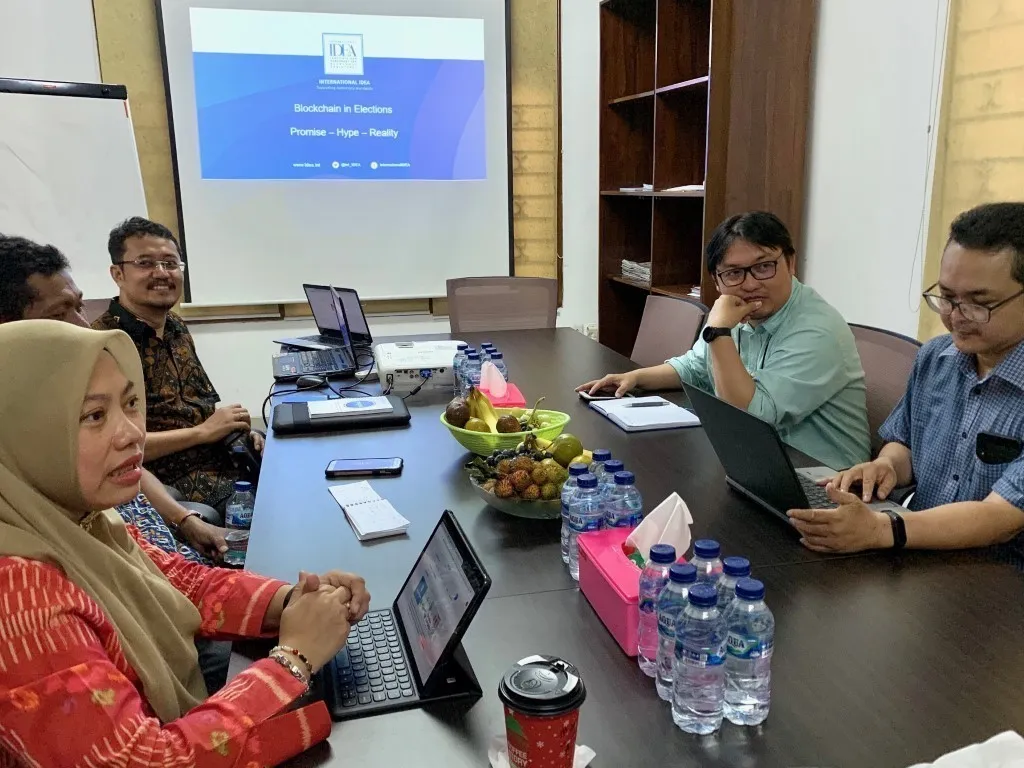Continued Cooperation with Civil Society during COVID-19 Pandemic: Indonesia’s Voting Technology Guide

Civil Society Organizations (CSOs) play a critical role in furthering sustainable democratic development in any country. The CSOs have for decades been important partners for International IDEA at global, regional and country levels.
In the context of the COVID-19 Pandemic, CSOs in Indonesia have been very outspoken in both mainstream and social media to ensure public health and safety are managed in any electoral process happening in the country. They are currently campaigning a petition to postpone this December’s Head of Region elections involving more than 100 million voters in almost half of the country’s provinces to 2021. Dialogue between them and the election management body (EMB) has been occurring daily. Webinars have been organized by various CSOs and academic institutions multiple times in a week since April, featuring civil society activists, election officials, politicians, academics and government officials. With physical distancing in place, quite naturally, technological solutions are being studied as potential solutions to the need to keep distance in electoral processes. Indonesia is no exception.
The adoption of voting technology has been part of the electoral reform debate in Indonesia for many years. A recent draft election law has been put in stronger language to allow the use of electronic voting machines for Head of Region Elections. While certain government and election officials are receptive to the idea of voting machines, it must be said that political parties and civil society are divided. Over time, the debates have grown more and more prominent. The necessity for certain guidelines in adopting voting technology was becoming more and more apparent.
In recent years, the Indonesian EMB has already made continuous progress with using a range of other election technologies and the provision of publicly accessible data. This includes the by now famous decision to enhance the transparency of election results by publishing all scanned result sheets in 2014, which triggered a massive civil society-lead crowd sourcing effort to tabulate and sum the results. Going forward, there is continued interest in Indonesia to expand the use of technology in elections, building on previous experience in Indonesia and worldwide.
Capturing these experiences was one objective for International IDEA when embarking on the project of drafting the “Adoption of Voting Technology A Guide for Electoral Stakeholders in Indonesia” in late 2018. Equally or even more important was the creation a project that is largely owned and driven by local CSOs and further strengthens domestic voting technology expertise in Indonesia.
International IDEA’s long time partner organization, Association for Elections and Democracy (Perludem), who cooperated intensively with Indonesian academics, journalists and other partner CSOs such as NETGRIT, which consists of former election commissioners. International IDEA supported this process with additional input and suggestions from a global perspective. International IDEA also hopes that this effort will inspire CSOs elsewhere to follow their Indonesian counterparts’ path.
As a result, the Bahasa Indonesia version of the guide was jointly launched in December 2019 with Perludem in the forefront. While there were guest speakers from the EMBs and also NETGRIT, the two Perludem authors played a pivotal role by providing in-depth explanations about the contents of the Guide to event participants: journalists, academics, election officials as well as international assistance providers such as the International Foundation for Electoral Systems (IFES). The publication was initially intended and launched for an Indonesian audience in Bahasa Indonesia only, but over time International IDEA received several requests for an English version. This was not least due to an increased discussion about how far election technology can provide solutions for holding elections during the COVID-19 crisis. For example, the advanced voter registration and vote counting technologies that the Republic of Korea used in their elections last April have proven effective, but their usability in other countries’ contexts must be assessed very carefully.
Responding to these requests, we continued our cooperation with Perludem in 2020, due to the lockdown now entirely online. This allows us now to present the English language version of the "Adoption of Voting Technology A Guide for Electoral Stakeholders in Indonesia". A guide that covers the breadth of technical innovations in Indonesian elections and puts them in a global context and perspective. The Guide covers the full range of systems used in Indonesia, including the voter data information system, the systems for political party registration, candidate nominations, campaign funding reporting, election results recapitulation and electronic voting trials. It discusses a range of issues from introducing those systems to cybersecurity challenges and puts them in the in context of the six Indonesian Election Principles with a specific focus on fairness, honesty, confidentiality and directness. All of this is complemented by global examples, experiences, best practices and principles.
We hope this guide can now also be a tool for other countries, that consider adopting more election technology to overcome some challenges brought by COVID-19. The English version will also enable another country’s version to be created with relative ease, an effort which International IDEA is read





